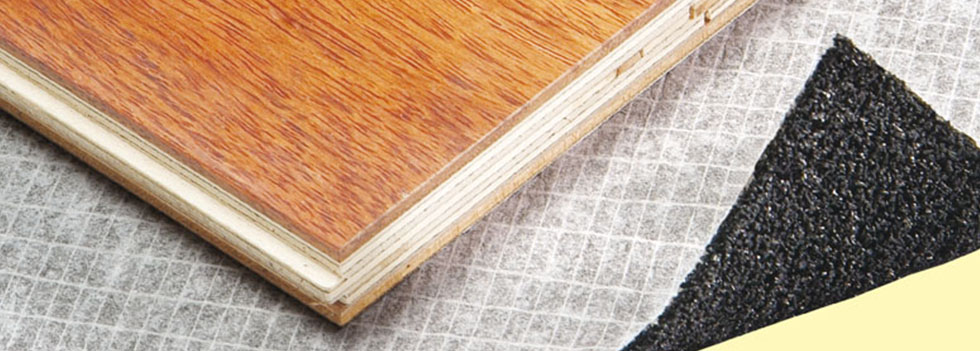There are many reasons why you may want to know how to soundproof vinyl flooring. Perhaps you are being disturbed by sounds coming from the floor below, or you don’t want to disturb others below when walking across the floors. Maybe you do not want to put down carpeting, but you don’t like the sound of impacts against your floor, either.
Ways to Soundproof Vinyl Flooring
But is it really possible for you to soundproof vinyl flooring? It certainly is, with the right preparation. What you will want to do is put down a soundproofing underlayment before you put the vinyl down. We recommend Dura-Son underlayment for all vinyl flooring that isn’t glued or nailed down. If you are using a vinyl flooring that is needed to be glued or nailed down, we recommend GenieMat RST underlayment. Apply the acoustic underlayment to the subfloor, then apply the vinyl flooring above it. If the vinyl is already down, your choice will be to pull it up to apply the vinyl flooring underlay or simply to put carpeting down over it.
Tips for soundproofing Vinyl Flooring
When you’re ready to soundproof your floor, preferably before you lay down your vinyl, make sure you have plenty of underlayment from Hush City soundproofing on hand. This affordable, highly-effective recycled rubber sound barrier fits in seamlessly with almost any floor material and provides better soundproofing than many other popular soundproofing options. It is safe to handle, easy to install and can have you enjoying great floor noise control right away.
Debunking Bogus Floor Underlayment Ratings
Some distributors and manufacturers will promote unusually high STC and IIC ratings for floor underlayment products. We believe these ratings perpetuate largely from a lack of understanding for what the ratings represent. Isolation products for walls will occasionally have ratings that are misleading, but rarely to a point of ridiculousness. Marketing for floor underlayment products, however, will claim ratings that are several times better than what is even physically possible in a structure. A few minutes of searching online will result in at least ten random underlayment materials with STC/IIC ratings north of 70. To add to that, most of these 70 plus STC/IIC rated products are only 1/16” thick, or at most 1/4” thick.
To understand how misleading these claims are, we have tests for 2” of solid rubber over 6” of concrete and 4″ of concrete poured over the rubber performing at IIC 64 and STC 72. Now the STC rating could get above 70, but only with 10” of concrete and 2” of rubber. Reduce the thickness of the rubber to 1” and the rating drops to STC 69. Reduce the thickness again to 3/8” and the rating drops to STC 54. From this, it is obvious to anyone with a little sense that if 2” is STC 72, 1” is STC 69, 3/8” is STC 54, then there is no way 1/16” of any material is anywhere near STC 70 plus.
Starting first with the characteristics of an underlayment suited for isolating impact footfall noise. Resilience is key to isolating impact footfall noise as it allows a cushion for the energy of sound (pressure of a footstep). Proper resilience can be created within a remarkably thin profile assuming that layer is truly resilient. Meaning it can properly deflect (compress) when put under stress and return to the original form when not under stress. A proper underlayment does not need to be soft like carpet pad, but must be resilient like rubber. Flexible vinyl’s, cork, rolls of composite material, or similar, are not significantly resilient products. Rubber is the clear winner for floor underlayments and more specifically for vinyl floors!
Benefits of soundproofing Vinyl Flooring
The obvious benefit of soundproofing a vinyl floor with a quality underlayment is that you can enjoy many of the impact soundproofing benefits of a carpeted floor without having to actually lay down carpet, and you will be able to effectively block airborne noise as well. In addition, your vinyl floor may last longer and look better with a quality underlayment underneath.
Underlayment is designed for impact sound control such as footsteps. If you require sound control for airborne sounds such as talking, music, TV, etc. you will need to add a layer of mass loaded vinyl (aka MLV) underneath of the underlayment. Doing both the underlayment and the MLV will give you a sound controlled floor that will last for years, and even increase the value of you home if you ever choose to sell it!
Contact Hush City soundproofing for Vinyl Floor soundproofing and Other soundproofing Assistance
Hush City soundproofing can easily help you soundproof your floor, but there’s a lot more to great noise control than just floor soundproofing. There’s the ceiling, the walls and possibly even pipes or door and window areas for you to consider, too.
That’s why we have a complete range of soundproofing products for your home, studio or office, along with experts who can teach you exactly how to use them. If you have any questions about how to install any of our products, the environmental advantages of using these products, or which products will work best for your application, please contact us today or anytime.
Share Blog:




